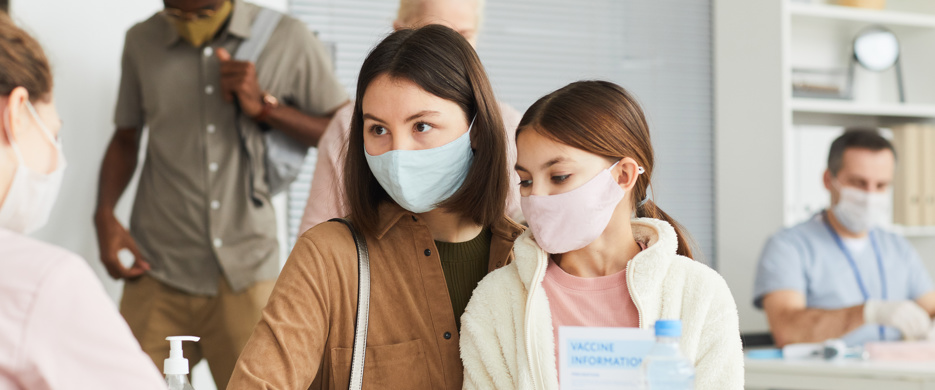
Parental Consent for Covid Vaccination for Children
In September 2021, the government announced that all children without an underlying health condition aged 12+ would be offered Covid-19 vaccination. On 30th January 2022, it went on to announce that children aged 5-11 who are in a clinical risk group or who live with someone who is immune-suppressed will be able to get the first dose of the COVID vaccine.
This article considers who can give valid consent to COVID vaccinations of children.
Whose consent is needed?
All those with parental responsibility should be asked to consent to their child’s vaccination.
All mothers have parental responsibility. Fathers have parental responsibility if married to their child’s mother or in a civil partnership with her. Fathers who appear on their child’s birth certificate also have parental responsibility. There are also other ways of acquiring parental responsibility which are not within the remit of this article.
If just one person holds parental responsibility, then they can act alone and consent to their child’s vaccination.
When can a child provide their own consent?
Where a child wants or refuses to have the COVID vaccine, and this is contrary to the decision of at least one of their parents, then the issue of ‘Gillick competence’ comes into play. If a child is Gillick competent it means that he/she has the capacity to decide a particular issue. Whether or not a child is Gillick competent varies according to his/her individual characteristics, maturity and understanding. It is not age dependent and a child under 16 may be considered to have enough understanding to make their own decision. If, in the opinion of the relevant health professional, a child has the capacity to decide whether to consent to their vaccination, a parent or guardian’s consent (or refusal) cannot override the child’s decision.
Cases where there is a dispute between parents
If one parent consents to their child’s vaccination, but the other opposes it, then an application may need to be made to court for a specific issue order. The writer recently had a case that dealt specifically with a dispute between parents over whether or not their 14 year old child should be given the Covid-19 vaccine. Most private law cases are private (i.e. neither the evidence nor judgement can be published), but on this occasion, the court authorised the release of an anonymised Judgment. You can read the full judgment here - Covid-19 Vaccination for children full court judgment
In this case, the mother’s application was for all NHS approved vaccinations to be given to her children. The father’s view was that the children were healthy, had good immune systems, and he did not believe that they required preventative vaccinations, including against COVID. A Cafcass Officer was appointed. She met with the parents and the children and reported that the 14 year old was of an age and understanding whereby he could understand the implications of being vaccinated, and he wanted to be vaccinated.
The father referred the court to the assessment by the Joint Committee on Vaccination and Immunisation (JCVI). This concluded that the health benefits from vaccination are marginally greater than the potential known harms. However, the margin of benefit was considered too small to support universal vaccination of healthy 12 to 15 year olds at that time. The Judge acknowledged the report, but also the fact the UK’s chief medical officers had decided that when combined with the Covid-19 related rise in mental health issues and educational disruption, there was sufficient justification for vaccinating this age group.
The court also considered an article submitted by the father from the BMJ (British Medical Journal) which is effectively summarised in its title, “Whatever teenagers and families decide, their views must be heard and respected”.
The court decided the father had failed to discharge the burden to disprove the scientific consensus recommending vaccinations. It was satisfied that it was in the best interests of the 14 year old and his younger brother to be given all of the vaccines which are recommended from time to time in the NHS vaccination schedule, including vaccinations for Covid-19 to the 14 year old, subject to the child’s own wishes and feelings.
The court also considered the question of whether the father should be allowed to take the children out of school to visit Australia. The court observed that the Australian authorities would not allow an adult to enter Australian territory without having had the Covid-19 vaccination. The father continued to refuse to have such vaccination, so it was therefore not necessary for the court to determine this aspect of the case.
What checks will be made to ensure all relevant consent has been given?
The NHS has confirmed that most children between the ages of 12 and 15 will be vaccinated at school and that parents or those with parental responsibility will receive information about when the vaccine will be offered to their child. They will be asked to give their consent.
The process of seeking parental consent will be the same as with all other school vaccination programmes and will be sought by the local School Age Immunisation Service (SAIS) provider. Schools have been asked to agree on a process and then share an information leaflet, consent form and information letter supplied by the SAIS team with parents and children.
The guidance that has been provided to schools by the government also states that “all parents or those with parental responsibility should be asked for consent. They will usually make this decision, jointly with their children. In secondary schools, some older children may be sufficiently mature to provide their own consent. This sometimes occurs if a parent has not returned a consent form, but the child still wishes to have the vaccine on the day of the session.”
Parental separation has been identified as a potential issue in the Covid vaccine rollout. Schools are recommended to ensure that both parents receive communications about the vaccine when they know they are separated. Otherwise, if one of the separated parents is not notified about when vaccinations are due to take place or asked to give consent, it could lead to a complaint against the school. Where there is a difference of opinion, it will be for the SAIS team to deal with it, not the school. It will also be for the SAIS team to deal with any question over a child’s Gillick competence.
Conclusion
The issue of Covid vaccinations is an emotive one and where separated parents have a different view, it will be difficult for a consensus to be reached. Parents should first consider the assistance of a mediator who can facilitate discussion and see whether an agreement can be reached. Ultimately, if parents cannot agree, then they may have no option but to apply to court for a Judge to decide what is best for their child.
As the law stands currently, where there is a dispute between parents over whether or not their child should be vaccinated against Covid-19, it is likely, in the absence of evidence to the contrary, that the court will consider it is in the best interests of a child for them to receive the Covid-19 vaccine.
The case referred to above did not consider the question of whether the 11 year old brother should receive the COVID vaccine, because the NHS were not then recommending vaccines to children under 12. However, applying the same logic as was applied to his 14 year old brother, where the NHS recommend vaccines to younger children and there is no evidence to the contrary, it is likely that the court will support the parent wanting their child to be vaccinated. The younger the child, the less critical will be their wishes and feelings, and the more important the parents’ consent will become.
We have received a growing number of enquiries from parents concerned that the other parent may give consent unilaterally or refuse to consent to their child’s vaccination. It is likely that any rollout of Covid-19 vaccinations to junior school children will be via school. Currently, government advice is that the consent of both parents must be sought if the school is aware that the parents are separated.
This article is written by Beth Woodward, a specialist family lawyer and partner at Neves. If you are in dispute over your child's Covid-19 vaccination and would like to discuss your personal situation please get in touch with Beth on 0330 0945 500, email family@nevesllp.co.uk or complete our Contact Form and we'll get back to you.

